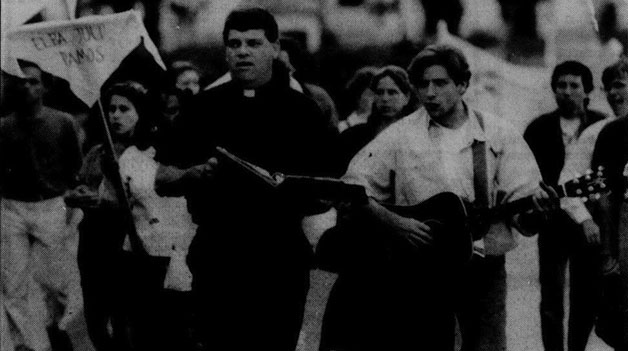Newly declared martyr has connection to Loyola
Members of the Loyola community, Fr. Tom Hidding and Doug Gleber, protest in downtown New Orleans on the anniversary of the murders in El Salvador in 1990. Although El Salvador is physically far away, Loyola still felt the effects of these murders.
April 17, 2015
While the Peace Quad is often seen as the heart of Loyola, professors and religious figures on campus are shining a light on its connection to the newly declared Jesuit martyr, Óscar Romero.
According to The Washington Post, Pope Francis signed a decree on Feb. 3 declaring that San Salvador’s Archbishop Óscar Romero was “killed in hatred of the faith,” making him a martyr and initiating his sainthood process.
Church officials debated whether Romero could be declared a martyr for his faith rather than for his political activism.
According to the Catholic News Service, Romero is an important figure in Central American history, remembered for his criticisms of the oppressive military government’s treatment of the poor and his denouncement of violence on both the political right and left.
He espoused Liberation theology, a movement characterized by encouraging people to seek freedom from oppression and to fight for their own self-determination and quality of life. The El Salvadoran government viewed the movement as a Marxist threat with Communist leanings and targeted its followers.
Uriel Quesada, director of the Center for Latin and Caribbean studies, said Romero was acutely aware of political injustices and was an outspoken critic of them.
“That’s why Óscar Romero is important: he realized not only that the people were repressed but also that everyone who denounced any kind of governmental abuse, any kind of injustice, any kind of violent situation in the country — a country with a long history of violence — was pretty much threatened or even killed,” Quesada said.
Liberation theology increased the role of social justice and actively advocated for political change.
“Liberation theology was very prominent in Latin America, and it was a theological and political movement that happened all over Latin America. It was very progressive, and at the same time it demanded a lot of political changes,” Quesada said.
After receiving threatening phone calls, a gunman shot Romero as he was conducting Mass at a hospital chapel in San Salvador on March 24, 1980, according to The Washington Post. Tensions in Central America then escalated into a full-scale civil war that would leave approximately 75,000 dead by its close in 1992.
A small part of El Salvador’s violent, political and socioeconomic history can be seen on campus in the “Plaza de los Martires de la Paz” or Square of the Martyrs of the Peace, more commonly referred to as the Peace Quad.
According to Loyola’s website, it was named in honor of the six Jesuit scholars, their housekeeper and her daughter who were murdered at the University of Central America in San Salvador. This occurred toward the end of El Salvador’s 12-year civil war on November 16, 1989.
The Peace Quad was dedicated in their memory the next year, and the university planted eight trees as a lasting memorial to the six Jesuit martyrs and two women.
Since this past November marked the 25th anniversary of their assassination, Loyola University Community Action Program sponsored “Martyrs Week 2014: 25 Years Later.” Joseph Deegan, LUCAP adviser and university minister for service and justice programs, said this week was specifically meant to recognize and remember the eight individuals killed in 1989.
Deegan said the week’s events included a trip by LUCAP members to protest at the School of the Americas in Georgia, where the people who martyred these eight individuals were trained. There was also a documentary screening by the Rev. Jeremy Zipple, S.J.
“The week included a peaceful vigil to end street violence hosted at St. Anna’s Episcopal Church downtown, our annual martyrs Mass and displaying eight banners to commemorate each martyr for the entire week,” Deegan said.
Thomas Ryan, director of the Loyola Institute for Ministry, recalled how New Orleans and Loyola responded to these eight killings when they occurred.
“I was a graduate student in the Loyola Institute for Ministry at the time. Their lives and deaths shook us tremendously and challenged us,” Ryan said. “A contingent from Loyola even went and protested at the federal building downtown, resulting in the arrests for civil disobedience of several people associated with Loyola.”
According to Mint Press News, the assassinations increased pressures on the Salvadoran government to sign peace agreements ending El Salvador’s civil war in 1992.
The civil war began with Romero’s death and ended with these eight assassinations. All nine of these people were killed in San Salvador for their faith and commitment to social justice, making Romero’s impending sainthood a nod to the others who died for the same reasons during this time.
Ken Weber, resident chaplain and university minister for liturgy and music, said he hopes that students will continue to remember the eight individuals and what they represent each time they walk through the Peace Quad.
“Standing up for social justice on a daily basis may be the most appropriate way to honor them now,” Weber said.







Rae Ann DiMaggio • Apr 23, 2015 at 9:50 am
Why do the Jesuits get involved in politics?